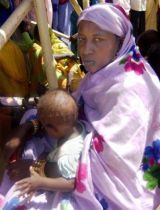Darfur situation remains ‘very fragile’: top US official
WASHINGTON, July 5 (AFP) — The situation in Sudan’s troubled Darfur region remains “very fragile” despite a lower number of deaths, a senior US State Department official said Tuesday.

|
|
Fatima Mohamad Ali, 27, holding her 1-year-old daugher, Amuna, attends a tribal reconciliation conference held outside of Nyala in the Darfur region of Sudan, Saturday, Feb. 19, 2005. (AP). |
Deputy Secretary of State Robert Zoellick told reporters the lull in violence in the strife-torn western region must be consolidated with the help of the incoming national unity government.
“There’s fewer deaths, but it remains a very fragile situation,” Zoellick said. A UN report last week said there was a considerable drop in the mortality rate in Darfur, though the health situation there remains precarious.
Fighting has raged in Darfur since February 2003, when local groups launched a rebellion in the name of the region’s black African tribes against marginalization by Khartoum’s Arab-dominated government.
Government troops fighting rebels in Darfur have been backed by militias — known as Janjaweed — that have been accused of murder, torture, widespread rape and other human rights abuses against the civilian population.
The Darfur conflict has claimed between 180,000 and 300,000 lives, with some 2.4 million civilians displaced from their homes, while an additional 200,000 have fled into neighbouring Chad. The United States has described the violence in Darfur as genocide.
“The militia situation remains basically as it was before,” Zoellick said.
“The militias aren’t attacking people, but no one told the militias to stand down either.”
He added that “the Sudanese military have pulled back, but you still have a lot of banditry, and you even have rebel on rebel conflicts.”
He warned that African Union peacekeepers who have been deployed to monitor a ceasefire, signed last year, would not have the strength to confront Sudan’s military or even the Janjaweed militia.
The African Union now has 3,320 troops in Darfur, including 450 observers and 815 police officers. The number is set to double by the end of September, ultimately reaching 12,000 soldiers.
“The AU is not a heavily armed force so if the government of Sudan were itself still engaged in military action, they would have a hard time standing up,” Zoellick said. “Even some of the Janjaweed have heavy enough equipment that the AU forces would have a hard time dealing with them.”
He added, however, that the AU troops do provide a “blocking presence.”
Foreign ministers from the Group of Eight leading industrialised nations called last month for extra troops to be deployed by the African Union. A G8 summit will start Wednesday.
Zoellick will travel to Darfur and Khartoum on July 9 for the inauguration of a new unity government created in a peace agreement that ended a separate, two-decade-old conflict pitting the government against rebels in Sudan’s south.
The State Department official indicated he would press John Garang, the ex-rebel leader in the North-South conflict, to help in negotiations between tribes in Darfur.
“I am increasingly convinced that even if you get peace accord negotiated in Darfur between the rebels and the government, to implement it over time you’re going need to tap into the tribal reconciliation process,” he said.
The Sudanese government and Darfur rebel groups agreed Tuesday on a declaration of principles which will form the basis for future political dialogue at their AU-sponsored peace talks.
Under the deal, the Khartoum regime agreed to guarantee traditional tribal ownership rights over land in Darfur and allow the black African region autonomy under a reformed federal constitution.
